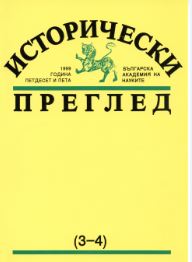Към участта на егейските българи - само с най-високи критерии
For the Fate of the Aegean Bulgarians - Only with the Highest Criteria
Author(s): Georgi DaskalovSubject(s): History, Ethnohistory, Political history, Social history, Recent History (1900 till today), Special Historiographies:, WW II and following years (1940 - 1949), Fascism, Nazism and WW II
Published by: Институт за исторически изследвания - Българска академия на науките
Summary/Abstract: For non-scientific considerations, the interest of Bulgarian historical science has for decades disregarded the war-time problems of Aegean Macedonia. This has made it possible for authors from our neighbouring countries to pile up numerous titles with anti-Bulgarian orientation. This faces today’s Bulgarian historians with the responsible task to look for the truth. Without paying attention to the high requirements, Prof. Dobrin Michev has not resisted the temptation of quick realization also in this circle of problems. Two publications connected with them confirm that. In them he displays his not being familiar with the general historical context, such as the occupation structure in Aegean Macedonia and the Greek political and military system in the region. This weakness and the not profound study of the documents and their literal reading confront him with a number of inaccuracies of principle and fact. As regards the publications concerned, Michev shows also another methodological specificity of his: to impose fundamental tendencies which are not adequate to the historical process but are to the theses he has built up in advance. In this striving of his he performs a manipulation of a short of the sources, rearranging the events in time and space. Thus he deliberately elevates the contribution of the Internal Macedonian Revolutionary Organization IMRO) in the armed struggle of the Aegean Bulgarians which he qualifies as an “uprising” and gives a wrong presentation of the role in and attitude of Sofia to the events taking place in the region and also of its representative here. In his jingoistic striving for heroizing Michev becomes an unintentional carrier of consolidated Greek and Skopie theses. Along with all that deals most imprecisely with the names of the historical persons up to here refers to Michev’s professionalism, present is also another “specificity” of his works, connected with scholarly morals. He not only tries to conceal the contribution of those who have written before him but also takes the liberty to “seize” documents already published by them and textual interpretation given by them, entering into the role of original discoverer. The heroic history of the Aegean Bulgarians does not deserve such delittantism and unethical approach.
Journal: Исторически преглед
- Issue Year: 1999
- Issue No: 3-4
- Page Range: 209-227
- Page Count: 19
- Language: Bulgarian
- Content File-PDF

